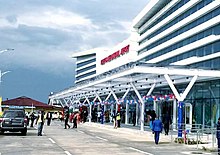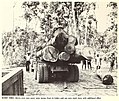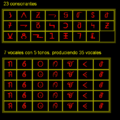Portal:Liberia
The Liberia Portal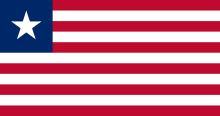 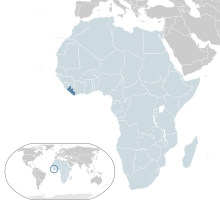 Liberia (/laɪˈbɪəriə/ ), officially the Republic of Liberia, is a country on the West African coast. It is bordered by Sierra Leone to its northwest, Guinea to its north, Ivory Coast to its east, and the Atlantic Ocean to its south and southwest. It has a population of around five and one-half million and covers an area of 43,000 square miles (111,369 km2). The country's official language is English; however, over 20 indigenous languages are spoken, reflecting the country's ethnic and cultural diversity. The capital and largest city is Monrovia. Liberia began in the early 19th century as a project of the American Colonization Society (ACS), which believed black people would face better chances for freedom and prosperity in Africa than in the United States. Between 1822 and the outbreak of the American Civil War in 1861, more than 15,000 freed and free-born African Americans, along with 3,198 Afro-Caribbeans, relocated to Liberia. Gradually developing an Americo-Liberian identity, the settlers carried their culture and tradition with them. Liberia declared independence on July 26, 1847, which the U.S. did not recognize until February 5, 1862. Liberia was the first African republic to proclaim its independence and is Africa's first and oldest modern republic. Along with Ethiopia, it was one of the two African countries to maintain its sovereignty and independence during the European colonial "Scramble for Africa". During World War II, Liberia supported the United States war effort against Germany, and in turn received considerable American investment in infrastructure, which aided the country's wealth and development. President William Tubman encouraged economic and political changes that heightened the country's prosperity and international profile; Liberia was a founding member of the League of Nations, United Nations, and the Organisation of African Unity. The Americo-Liberian settlers did not relate well to the indigenous peoples they encountered. Colonial settlements were raided by the Kru and Grebo from their inland chiefdoms. Americo-Liberians formed into a small elite that held disproportionate political power; indigenous Africans were excluded from birthright citizenship in their own land until 1904. In 1980, political tensions from the rule of William R. Tolbert resulted in a military coup, marking the end of Americo-Liberian rule and the seizure of power of Liberia's first indigenous leader, Samuel Doe. Establishing a dictatorial regime, Doe was assassinated in 1990 in the context of the First Liberian Civil War which ran from 1989 until 1997 with the election of rebel leader Charles Taylor as president. In 1998, the Second Liberian Civil War erupted against his own dictatorship, and Taylor was overthrown by the end of the war in 2003. The two wars resulted in the deaths of 250,000 people (about 8% of the population) and the displacement of many more, with Liberia's economy shrinking by 90%. A peace agreement in 2003 led to democratic elections in 2005. The country has remained relatively stable since then. (Full article...) Selected article -Roberts International Airport (IATA: ROB, ICAO: GLRB), informally also known as Robertsfield, is an international airport in the West African nation of Liberia. Located near the town of Harbel in Margibi County, the single runway airport is about 35 miles (56 km) outside of the nation's capital of Monrovia, and as an origin and destination point is referred to as "Monrovia". Locally, it is often referred to as simply "RIA." The airport is named in honor of Joseph Jenkins Roberts, the first President of Liberia. The airport is the nation's busiest and most important aviation facility, currently hosting the country's only scheduled commercial airline services, with direct connections to several major cities in West Africa as well as flights to Europe on Brussels Airlines. The airport reportedly served 228,000 passengers annually in 2018 and recently underwent a major expansion, including the opening of a new passenger terminal. The facility with its 11,000 feet (3,353 m) long runway was an emergency landing site for the United States' Space Shuttle program and is one of only two with paved runways in the country. While Monrovia's secondary airport, Spriggs Payne, is much closer to the city center and possesses the nation's only other paved runway, it has not had scheduled commercial service since ASKY Airlines suspended service in November 2014. (Full article...)Did you know -
More Did you know (auto generated)
Selected image - Credit: National Archives and Records Administration,
Presidents Edwin Barclay and Franklin D. Roosevelt in 1943. TopicsCities and townsRelated portalsWikiProjectsAssociated WikimediaThe following Wikimedia Foundation sister projects provide more on this subject:
SourcesDiscover Wikipedia using portals |

